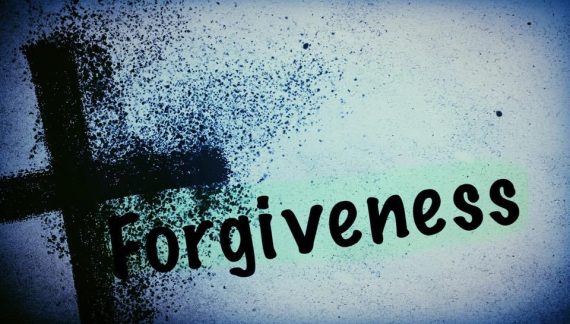In 1 John 1:9, we are invited to confess our sins so that God will forgive us. The verse says this:
If we confess our sins, He is faithful and just to forgive us our sins and to cleanse us from all unrighteousness.
But does this mean that if we do not confess our sins to God, He will not forgive us? No, the truth is that God has already forgiven you for all your sins, past, present, and future.
 So what did the Apostle John mean when he wrote 1 John 1:9? To understand this verse, we need to understand three things. We need to understand the meaning of the word “confess,” the meaning of the word “forgive” and the overall message and theme of 1 John.
So what did the Apostle John mean when he wrote 1 John 1:9? To understand this verse, we need to understand three things. We need to understand the meaning of the word “confess,” the meaning of the word “forgive” and the overall message and theme of 1 John.
Let us look at these three key ideas.
The Meaning of the Word “Confess”
The word confess comes from the Greek word homologeō, and it literally means “to say the same thing.” The word means more than just to admit, proclaim, or declare something. Instead, it has in view a conversation with God or others about what is true, and we agree with them about what they are saying.
The opposite of confession is denial (arneomai). When God makes a statement about some truth, we can either agree with God or disagree (John 1:20; 1 John 2:23). Therefore, the word “agree” might be the best translation of homologeō.
To confess is to align with what God is saying, or to agree with Him about something.

Obviously, there are lots of truths we can agree with God about. Almost every statement in Scripture requires us to either agree or disagree. Yet when we study the word confess in Scrip-ture, we discover that confession, or agreement with God, has nothing whatsoever to do with gaining or keeping our eternal life, but rather with aligning ourselves with God’s perspective on things.
Never forget that we gain the free gift of eternal life simply by believing in Jesus for it. No confession or agreement is necessary. No turning from sin. No submission to Jesus as Lord and Master. No public declaration about being part of the family of God.
All such things are good works that are important for the life of the Christian, but which are not requirements for receiving eternal life.
Yet after we believe in Jesus for eternal life, God begins to work with us as His children to mold us and conform us into who He created us to be. When we are born again into the family of God, we begin our life as one of His children.
But God does not stop with just giving us new life in Jesus. No, once we have life, He wants us to grow and mature and become productive members of His family. So through Scripture, the church, and the Holy Spirit, God begins to teach us things about Himself, about ourselves, and about how to follow Jesus. And when we see these truths, we can either agree with God or disagree.
If we agree with what God teaches us, then we align ourselves with what God has said, and we begin to make the necessary changes in our lives that come from this agreement.
But if we disagree, if we deny the truth of what God has said, then we continue to live in ignorance and self-deception, and we will not make progress in our lives as Christians. We will remain part of the family of God, but we will remain immature and fruitless.
So the word confess means to agree with about the things He teaches, especially regarding those things that help us live up to our identity as children of God.
This definition of “confess” will help us understand 1 John 1:9, but before we consider the verse, let us look at the word “forgive.”
The Meaning of the Word “Forgive”
I have gone over the meaning of the word “forgive” multiple times on this website, so I won’t go through it in depth again.
The main point to remember is that there are two kinds of forgiveness in the Bible. There is charizomai forgiveness, which is free and unconditional. God freely extends charizomai forgiveness to all people throughout all time for all sins, no matter what. Believers and unbelievers alike have charizomai forgiveness. It does not require confession or repentance. All sins–past, present, and future-are freely forgiven by God with this type of forgiveness.
The second type of forgiveness is aphesis forgiveness. It is always conditional, and is for our benefit; not God’s. Though God has freely forgiven us for all our sins, if we want to experience the release from the bondage of sin, then there are things we need to do … such as confess, repent, and purify our lives.
You can probably already guess which type of forgiveness is mentioned in 1 John 1:9. Yes, since confession is mentioned, then it makes sense that the second type of forgiveness, aphesis forgiveness, is in view.
See this article on forgiveness for more or you can also take the lesson on “Forgiveness” in my Gospel Dictionary Online Course.

And while this key helps our understanding of 1 John 1:9 the most, let us turn to the third key, which is the overall theme of 1 John.
The Overall Theme of 1 John
Some people think that the letter of 1 John is about how to know whether or not you have eternal life. Some people teach that 1 John contains “Tests of Life” and if you pass these tests, then you can know that you have life.
But this is not at all why John wrote this letter. Instead, as if evident from the opening verses, John wrote this letter because He had fellowship with Jesus, and wanted to share this fellowship with others.
“Fellowship” is just a biblical word for “friendship.” (This word also will be covered in the Gospel Dictionary Online Course).
 You can have a relationship with somebody, but not fellowship. For example, if you had a fight with one of your parents several years back, you are still related to them and are still part of the family, but you might not call them on the phone or get together for holidays. You are related, but do not have fellowship. You are not abiding or remaining with them in an ongoing friendship.
You can have a relationship with somebody, but not fellowship. For example, if you had a fight with one of your parents several years back, you are still related to them and are still part of the family, but you might not call them on the phone or get together for holidays. You are related, but do not have fellowship. You are not abiding or remaining with them in an ongoing friendship.
So John is writing his letter to Christians, to people who are in a relationship with God and with each other, as members of the family of God, and is telling them how to have fellowship with God and with each other. John wants His readers to be friends with God and friends with one another.
This also helps us understand 1 John 1:9.
Confession in 1 John 1:9
So let us take the three keys we have learned and put them all together as we seek to understand 1 John 1:9. Once again, the verse says this:
If we confess our sins, He is faithful and just to forgive us our sins and to cleanse us from all unrighteousness.
If you are in a relationship with someone, such as a spouse, a parent, or a child, and you want to maintain a friendship with them, then one of the things you will need to do is regularly own up to the things you have done wrong in that relationship.
Similarly, if someone wrongs or hurts you, this pain and betrayal causes a rift between the two of you, so that you probably don’t want to talk to them or hang out with them again. Oh yes, you are still related to them by the bonds of blood or marriage, but you might not want to spend much time in their presence.
But that rift, that pain, that sense of betrayal can be healed, right? And how can it be healed. By the other person owning up to what they did wrong, and by agreeing with you that what they said or did was hurtful to you. In other words, they need to confess their sin.
It is the same when you have wronged someone else. If you wronged somebody, you can’t just move on in the relationship acting as if nothing happened. The other person was hurt, and they need to know that you are sorry for what you did, and will work to make sure it doesn’t happen again.
All of this is also true in our relationship with God. When we sin, God is saddened by our behavior. As a result, our fellowship with God is broken. Just like Adam and Eve in the Garden of Eden, when we sin, we often go hide in the bushes because we do not feel like God wants to see us.
 The first step in healing this brokenness is by confessing our sin and agreeing with God that what we did was wrong.
The first step in healing this brokenness is by confessing our sin and agreeing with God that what we did was wrong.
So while God unconditionally extends forgiveness (charizomai) to all people, and so we are all forgiven for all our sins, if we want to actually experience a release (aphesis) from our bondage to sin, the first step is to agree (confess) with God that we have sinned.
If we do this, we will gain release from our slavery to sin, and He will work to cleanse us and purify us from all our unrighteous practices, and in this way, our fellowship with God will develop and grow.
So do you want to be friends with God? One of things that will help is letting Him point out your sin to you, so that you can agree (confess) with Him where you have indeed done wrong. Then, once you agree, let Him further guide you into breaking free from this sin so that you can no longer be addicted and enslaved to it.
This is the message of 1 John 1:9. If you agree with God when He points out your sin to you, He is faithful and just and will help release you from this sin, and will help guide you into all the ways of righteousness. This way of living will help you grow in friendship with God and others.
Does this help you understand 1 John 1:9 and the role of confession? If you still have questions or comments, leave them in the comment are below!
 Understanding the Gospel requires us to properly understand the key words and terms of the Gospel. Take my course, "The Gospel Dictionary" to learn about the 52 key words of the Gospel, and hundreds of Bible passages that use these words.
Understanding the Gospel requires us to properly understand the key words and terms of the Gospel. Take my course, "The Gospel Dictionary" to learn about the 52 key words of the Gospel, and hundreds of Bible passages that use these words.
This course costs $297, but when you join the Discipleship group, you can to take the entire course for free.




It sounds so right. I do wonder, who else is teaching this way? And just to clarify, when you say God has already forgiven us for our sins past, present and future, you are referring to believers, am I correct? The thing that I have observed myself is that we live just one day at a time, the present day, so concerning the future, it’s a moot point, isn’t it?
Carol,
Lots of people are teaching similar things. I have found similar ideas in NT Wright, Robert Farrar Capon, Robert Wilkin, Sharon Baker, and numerous others.
As for the forgiveness of all sins, no, this is even of non-believers. The thing that separates a believer from a non-believer is not the forgiveness of sins, but that believers have the positive righteousness of God within them through faith in Jesus Christ.
Yes, the future is a moot point, but many people worry about some “future sin” they might commit which could separate them from God. This idea helps them see that nothing can separate them from His love.
Here’s a question in the same vein. Since God knows all of our needs do we need to lift up our prayers and supplications to him in the first place?
I contend that God wants us to confess though sins to him so that he sees that we know that we have send and the extent of our sins and their by the greatness and depth of the love of Christ’s sacrifice on on the cross for us.
And he wants us to vocalize our real needs and our real prayers so we made discern between wants and needs and the supernatural provision he and only he can provide.
God doesn’t need you to ask him for things so that He can know what you want. But talking to Him about these things is for the purpose of building your friendship and relationship with Him.
This guy says weird stuff like pray less. And when you ask him a certain question he won’t answer he belongs to the Lord of this earth and I’m not talking the father in heaven.
Jesus said weird stuff too … which offended the legalistic pharisees so much, they accused Him of being of the devil…. Hmmm.
I have read your article with interest and have liked the way you handle key words in the text. However your conclusion seem to undo the meaning in the key words to reflect original intention of John and the meaning that the original readers of I John understand.
In your conclusion you say “This is the message of 1 John 1:9. If you agree with God when He points out your sin to you, He is faithful and just and will help release you from this sin, and will help guide you into all the ways of righteousness. This way of living will help you grow in friendship with God and others.”
I think you should have helped your English readers of the text that Greek conditional sentences are not necessarily similar to English conditional sentences. I John 1:9 uses third type of Greek conditional sentence. That would remove misunderstanding in your conclusion. Otherwise one gets the impression from your conclusion that it is our agreement with God that activates his forgiveness and cleansing,
Great article!
But I just have a simple clarification.
“So while God unconditionally extends forgiveness (charizomai) to all people,…”
Does “all people” here pertains to believers/God’s people (those who received positional forgiveness)? Because if it pertains to the whole world in general which includes unbelievers, it will be consistent to the truth in the Bible. Thank you in advance.
Jeremy, I had read what you have written on this site, which had been helpful to me. I had a question regarding a topic in the bible, I believe you had written a series of articles on that topic, which had been very helpful to me and answers a lot of question in my mind, but I still have questions regarding that issue in my case.
Those articles which I read were written a few years ago, I don’t think people will respond to the comment section, this article is on a different topic. So if I may ask, is it possible for me to contact you through other methods? I saw a Contact Form from your webpage(redeeminggod.com/about), can it be used to email you my question?
what of when one claim to have confess his or her sins to God and yet still find him or herself still falling victim of that particular sin after several confession and repentance has been made
“Never forget that we gain the free gift of eternal life simply by believing in Jesus for it. No confession or agreement is necessary. No turning from sin. No submission to Jesus as Lord and Master. No public declaration about being part of the family of God.” As quoted from above.
So by your statement even demons will receive eternal life?
Jas 2:19 You believe that God is one; you do well. Even the demons believe—and shudder!
Repent and be baptized – Acts 2:38
Confess – Rom 10:9
Remain faithful (turning away from sin) – Rev 2:10
I really hope I have mis-read your statement above, otherwise you are leading everyone in the wrong direction.
I have discussed all of these texts elsewhere on the site. Feel free to use the search function at the bottom to read what I have written.
As for demons, God has not offered eternal life to them if they believe in Jesus for it. So no, they do not get eternal life if they believe in Jesus. Search my site for “faith of demons in James 2.”
So as a believer do I still need to confess my sins everyday? Or is 1john 1 vs 9 for unbelievers?
Great Blog!
Unconfessed sin I our life grieves or quenches the Holy Spirit. The remedy for sin in the life of any Christian, 1JOHN 1:9, confess or name the sin. As mentioned by Lewis S. Chafer (founder Dallas Theological Seminary) the Christian should always keep close accounts with God. Immediately naming or confessing our sin. Thus, filling and influence of the Holy Spirit.
Thank you for your clear answer and interpretation to 1 John 1:9. I have only one question to ask: who do you confess your sin to? If you sin after you’ve been saved? Does Jesus want us to confess our sin to Him? Or to another human? Please clarify this to me. It’s been troubling me for a long time. Can I confess my sin to GOD? Or do I need a pastor? Or just another brother/sister in Christ?
Are believes suppose confess our sins to God ?
When does God forgive our sins ,Is it when we confess ?
Biblehub shows the Greek word for confess in I John 1:9 to be the word “homologomen”. https://biblehub.com/greek/omologo_men_3670.htm
Therefore, why do you say it uses “aphesis”?
Where do I say that? I’m talking about the word “forgive” here, which IS aphesis.
I am so sorry. I totally looked at the word for confess and not forgive. Please forgive (aphesis) me.
-Mike
Dear brother in Christ,
“If” is conditional here. My opinion is that if believers do not confess their sins then God is faithful and just to not forgive their sins and to not cleanse them. Since you disagree based on your theology, then you would have to take every conditional “if” clause in the Bible and interpret it as not meaning the opposite if the “if” clause is not met.
For example, Luke 17:3 would mean that we are to forgive those who sin against us without their repentance. Again, in Roman’s 10:9, we wouldn’t have to “confess with your mouth Jesus as Lord and believe in your heart that God raised Him from the dead” to be saved.
Finally all the warnings related to the repentance clauses in Revelation are meaningless if Jesus didnt really mean what He says.
I try not to be dogmatic. I can always be wrong. But the grammar in I John 1:9 leads me to think along the lines I wrote at the beginning.
Blessings in your ministry.
Hi, can you possibly point me to pre-20th century theologians or commentaries that support your position here? I understand (i think…lol) that John was addressing the gnostics (who say they have no sin) with the idea that they would need admission to sin(s) in order to be saved. That John was indicating the was of salvation to the deniers that Jesus was the Christ in physicality also. I am being challenged by someone that the early church fathers and later theologians (per-29th century) did not recognize this verse as being offered to unbelievers as the was of salvation, but to christians for continued fellowship to God. I agree with you, but would like direction to answer the critics facing me. 🙂 Thank you!!!
Though I can say amen wholeheartedly to most of what you say there was one line that didn’t seem to match exactly with what is said in Roman’s 10 – where confession is linked to salvation at the moment of believing in Jesus for salvation. You said you don’t need to confess to be saved. Perhaps I have misunderstood this statement because you then go on to say how important confession is in maintaining fellowship . If so perhaps you could explain that though Salvation is first and primarily a word of the Holy Spirit working inside saving faith in Jesus from beginning to end that confession (Jesus is Lord) is the first and essential response of the human will to the free gift of God’s grace offered to us through Jesus atoning and redeeming work on the cross.
You are close, but not there with your explanation of 1 John 1:9. Yes God has already taken away our sins. Does it make sense to ask for what you already have? No. You only ask for what you have when you don’t know you have it. That is why you keep on asking.
Did you read 1 John 1:8? If you claim or confess you do not have sin, the truth is not in you. If the truth is not in you are you saved? No you are not.
Did you read 1 John 1:10 If you claim or confess you have not sinned you are a liar and the word is not in you. Is that a lost or saved person? Lost.
John answers verse 8 and 10 with verse 9. Do you see that?
This is not about confessing our sins to God every time we sin. Please do not compare our relationship with God to our relationship with our children. That is bringing God’s truth and love to our level. Bad idea.
To confess your sin to God after each and every sin is hidden legalism. You are under the law and the purpose of the law is to bring you to Christ. So I wonder about people under the law, are they really saved? Has the law done it’s work?
1 John 1:9 is not a Christian bar of soap.
You are going to have to dive deep here and realize that 1 John 1:9 is a salvation verse to the unsaved gnostics who say they have no sin and claim they have not sinned. That is not a born again person. Do you know a born again person who claims this? No.
Having read all of the comments on this article, your interpretation is the one that makes the most sense to me. To say in one breath all sin has been forgiven and then in the next breath, God is faithful to forgive you IF you confess your sin has always seemed contradictory to me. Thank you for clarifying an issue which is often a source of confusion among Christians.
If God has already forgiven us for all our sins and does not remember them anymore then why would we need to remind him of our sins again when He himself through his forgiveness, has already forgotten all of them? If we can break fellowship with God because of our sin then that would mean that we have not been completely forgiven in Christ and that He still will hold our sin against us until we work to regain His fellowship through our confession and not through the complete forgiveness that was provided at the cross.. Thank you..
This is a lot that is “implied” by the verse. Why wouldn’t the concept that you suggest be just a little more clear and straight forward? Someone who doesn’t know greek or hermeneutics would have a hard time pulling what you are saying from the text. We have been forgiven of our sin and cleansed from all unrighteousness already by Christ and His cross. John is writing to believers who know this. Why would he then seem to imply the opposite of what you say by simply stating, as he has done, that if you confess you are forgiven and cleansed. Wouldn’t it be easier to understand the meaning to be related to an agreement of sin (acknowledgment), and the consequence of that acknowledgment being that God forgives and cleanses? How is an ordinary person to pull from this text that it relates to relationship management, ie ongoing fellowship pertaining to sanctification? Isn’t it more clear that John would be telling those in his audience that were of the gnostic persuasion that if they agree with God concerning their sin then they would be forgiven because God is just and will do what He said He would do regarding such an agreement? How can we infer that this verse concerns sanctification and the believer verses a salvation statement to those who were in opposition to what John was preaching? Contextually doesn’t it seem to deal with those he has been referring to who would say that they had no sin….that if they agreed with what God says about it then they would enjoy forgiveness and cleansing? I’m confused. Thanks for your time – Randy
Thank you so much for this explanation. I knew that as far as the east is from the west, so has he
removed our sin from us; past, present and future. However, I hear preachers preach on this verse putting us on guilt trips to confess, confess and I along with most of the Christian world have been lead astray in the definition of this verse. But it contradicted the fact that by His stripes we were healed! Thank you so much for making this clear. Hallelujah!